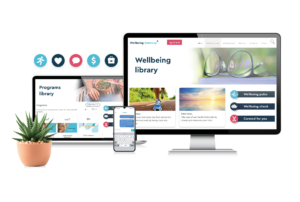With social connection being a key pillar of overall health and wellbeing, building and maintaining strong relationships is essential for a fulfilling life.
Regardless of whether it is a personal or professional relationship, healthy relationships revolve around the same key principles – effective communication, trust, empathy, and mutual respect.
Here are some practical tips to help you cultivate and sustain healthy relationships both at work and at home.
1. Communication is key
Effective communication is the foundation of any strong relationship.
Be clear, concise, honest, and actively listen.
At work, this means being open to feedback and expressing your ideas clearly.
At home, it involves sharing your thoughts and feelings openly.
2. Make the effort
Some connections come easily, but strong relationships require time and effort to maintain.
At work, make time for regular check-ins with team mates over lunch or coffee, or put a video call in the diary if you work remotely.
At home, prioritise and be present for family time.
This can be as simple as sharing a meal together every day, or having some dedicated device-free time each day to talk about your day.
3. Thank you goes a long way
It’s always nice to have your efforts acknowledged.
Expressing gratitude can significantly strengthen your relationships.
Take a moment to acknowledge the efforts and contributions of those around you whether big or small.
At work, this could be as simple as thanking a colleague for their help or giving them a shout out in an appropriate forum (to their manger, via an online rewards program, in a team meeting).
At home, regularly show appreciation for the little things your family members do so they know their effort isn’t taken for granted.
4. Be reliable and trustworthy
Trust is important in any relationship.
It can be difficult to build and easy to break.
Build trust over time through consistent actions – be dependable and follow through on your commitments.
At work, this means showing accountability, setting clear expectations, meeting deadlines and being a reliable team member.
At home, it involves showing up for your family and following through on promises no matter how small.
5. Practice empathy
Empathy is a bridge to connection and involves understanding and sharing the feelings of others while steering clear of judgement.
In a professional setting, this means being considerate of the different perspectives and challenges within your team.
At home, it involves being sensitive to the emotions and needs of your family members.
Being empathetic requires you to be vulnerable and in touch with your own emotions.
6. Make up
Conflict is inevitable, but how you handle disagreements or differences of opinion can make or break a relationship.
Approach conflicts from a place of empathy and focus on finding a solution rather than placing blame.
Whether at work or at home, be calm and respectful, avoid using sweeping and accusatory language (‘you always do…’, ‘you never…’), outline how you are feeling, and take a break if you need to.
It is better to pause a conversation and come back to it when you can approach it calmly than to say something you may regret in the heat of the moment.
The information contained in this article is for educational and informational purposes only and is not intended as health, medical or financial advice. Always consult a qualified health provider with any questions you may have regarding your health or a medical condition.
Something on your mind?
If you require counselling, coaching or support, our clinicians are available to help.
Call, chat or request an appointment online.
Looking for more resources?
Register for Wellbeing Gateway. Your personalised mental health and wellbeing companion.

